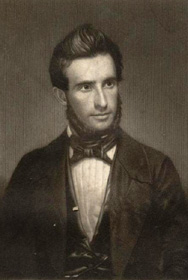THE Book of Mormon AND THE LIMITS OF NATURALISTIC CRITERIA: COMPARING JOSEPH SMITH AND ANDREW JACKSON DAVIS
An excerpt:
...The pragmatic nature of faith seems not only to reflect a belief in “things which are not seen, which are true” (Alma 32:21), but likewise involves a subjective disbelief in alternative possibilities. Thus, doubt comes to play a role in the composition of faith. The embedded reliance on naturalistic arguments, however tangential, therefore presents the uneasy and troubling possibility that a portion of one’s faith rests upon a foundation of limited mortal assumptions, constrained within the narrow and finite compass of an individual’s personal knowledge, hopes, needs, and experience. As such, the presumably solid rock foundation of faith turns out to contain a lot of destabilizing sand.
Comparing American Seers:
With such thoughts on faith and belief serving as a meditative backdrop, we might treat these naturalistic arguments as a convenient analytic framework to compare—and contrast—Joseph Smith and his 1829 translation of the Book of Mormon with Andrew Jackson Davis (1826–1910), another early American “prophet and a seer,” and his trance performance of The Principles of Nature (1847).9
For within this comparison, we find another complex text produced by a speaker with limited formal education and training, created under similar conditions and circumstances, and a work that stands as its young creator’s greatest masterpiece, even though the text was created at the dawn of the speaker’s career. Davis, like Smith, was raised in a poor household and received little formal education—Davis, in fact, would claim to have received only “little more than five months” of schooling.10 Davis also received visions and met with angelic messengers, who informed him that he was chosen to reveal important truths to the world. Through a mystical process of mesmeric trance and “conscious clairvoyance,” Davis dictated—without the use of notes, manuscripts, or books—his first and most popular volume, The Principles of Nature, Her Divine Revelations, and a Voice to Mankind, which, at approximately 320,000 words, contains a collection of intricate revelations that many of his readers treated as new scripture.11 Though Davis eventually composed more than thirty books, The Principles of Nature would remain “the most famous” and influential text of his career.
These broad-stroke comparisons do not, however, do justice to the compelling and oftentimes uncanny similarities between Smith and Davis. A closer examination of the circumstances surrounding the oral production of their works—both their similarities and important differences—can thus provide crucial insights into the cultural context in which these two fledgling seers performed their respective texts into existence. Moreover, such a comparative exploration alerts us to the problems of invoking arbitrary criteria in a strategic effort to privilege the work of a favored candidate.
https://www.dialoguejournal.com/themenc ... 3N03_4.pdf
